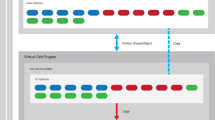Abstract
Fast Internet connections and the widespread use of high performance graphic cards are making Distributed Virtual Environments (DVE) very common nowadays. The architecture and behavior of these systems are very similar to new grid computing applications where concepts such as sharing and high scalability are extremely exploited. However, there are several key issues in these systems that should still be improved in order to design a scalable and cost-effective DVE system. One of these key issues is the partitioning problem. This problem consists of efficiently assigning clients (3-D avatars) to the arbiters (servers) in the system. As an alternative to the ad-hoc heuristic proposed in the literature, this paper presents a comparison study of two evolutionary heuristics for solving the partitioning problem in DVE systems. Performance evaluation results show that heuristic methods can greatly improve the performance of the partitioning method, particularly for large DVE systems. In this way, efficiency and scalability of DVE systems can be significantly improved.
Access this chapter
Tax calculation will be finalised at checkout
Purchases are for personal use only
Preview
Unable to display preview. Download preview PDF.
Similar content being viewed by others
References
Anderson, D.B., Barrus, J.W., Howard, J.H.: Building multi-user interactive multimedia environments at MERL. IEEE Multimedia 2(4), 77–82 (Winter 1995)
Barham, P., Paul, T.: Exploiting Reality with Multicast Groups. IEEE Computer Graphics & Applications, 38–45 (September 1995)
Delmaire, H., Díaz, J.A., Fernández, E., Ortega, M.: Comparing new heuristics for the pure integer capacitated plant location problem. Technical Report DR97/10, Department of Statistics and Operations Research, Universitat Politecnica de Catalunya, Spain (1997)
Duda, R., Hart, P., Stork, D.: Pattern Classification, pp. 567–580. Wiley Intescience, Chichester (2000)
Foster, I., Kesselman, C. (eds.): The Grid: Blueprint for a New Computing Infrastructure. Morgan Kaufmann, San Francisco (1999)
Foster, I., Kesselman, C., Tuecke, S.: The Anatomy of the Grid: Enabling Scalable Virtual Organizations. International Journal of Supercomputer Applications 15(3) (2001)
Haupt, R.L., Haupt, S.E.: Practical Genetic Algorithms. Wiley, Chichester (1997)
Laarhoven, P.V., Aarts, E.: Simulated annealing: Theory and applications. Reidel Publishers, Dordrecht (1987)
Lewis, M., Jacboson, J.: Game Engines in Scientific Research. Communications of the ACM 45(1) (January 2002)
Lui, J.C.S., Chan, M.F., Oldfield, K.Y.: Dynamic Partitioning for a Distributed Virtual Environment. Department of Computer Science, Chinese University of Hong Kong (1998)
Lui, J.C.S., Chan, M.F.: An Efficient Partitioning Algorithm for Distributed Virtual Environment Systems. IEEE Trans. Parallel and Distributed Systems 13(3), 193–211 (2002)
Miller, D.C., Thorpe, J.A.: SIMNET: The advent of simulator networking. Proceedings of the IEEE 83(8), 1114–1123 (1995)
Nitta, T., Fujita, K., Cono, S.: An Application Of Distributed Virtual Environment To Foreign Language. In: Proceedings of FIE 2000, IEEE Education Society, Kansas City, Missouri (October 2000)
Salles, J.M., Galli, R., Almeida, A.C., et al.: mWorld: A Multiuser 3D Virtual Environment. IEEE Computer Graphics 17(2) (March-April 1997)
Singhal, S., Zyda, M.: Networked Virtual Environments. ACM Press, NewYork (1999)
Tam, P.T.: Communication Cost Optimization and Analysis in Distributed Virtual Environment. M. Phil second term paper, Technical report RM1026-TR98-0412. Department of Computer Science & Engineering.The Chinese University of Hong Kong (1998)
Author information
Authors and Affiliations
Editor information
Editors and Affiliations
Rights and permissions
Copyright information
© 2004 Springer-Verlag Berlin Heidelberg
About this paper
Cite this paper
Morillo, P., Fernández, M., Pelechano, N. (2004). A Grid Representation for Distributed Virtual Environments. In: Fernández Rivera, F., Bubak, M., Gómez Tato, A., Doallo, R. (eds) Grid Computing. AxGrids 2003. Lecture Notes in Computer Science, vol 2970. Springer, Berlin, Heidelberg. https://doi.org/10.1007/978-3-540-24689-3_23
Download citation
DOI: https://doi.org/10.1007/978-3-540-24689-3_23
Publisher Name: Springer, Berlin, Heidelberg
Print ISBN: 978-3-540-21048-1
Online ISBN: 978-3-540-24689-3
eBook Packages: Springer Book Archive





